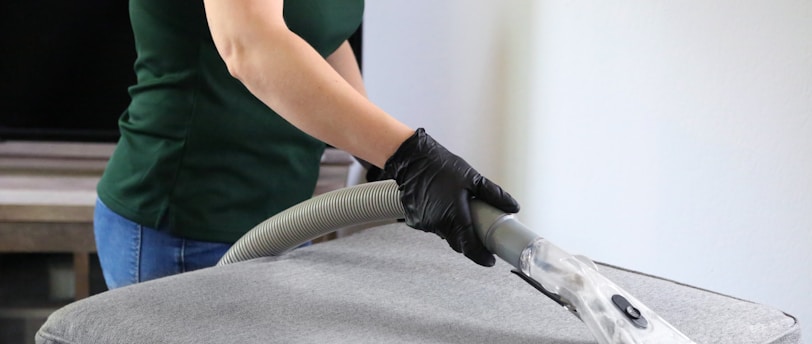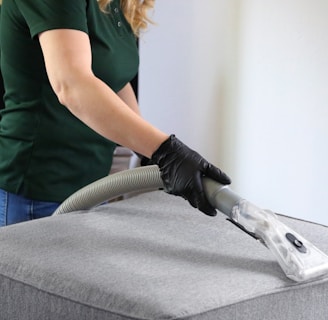Spring into Action
The Health Benefits of Spring Cleaning
IHH Staff
3/17/20255 min read


The Physical Benefits of Spring Cleaning
Engaging in spring cleaning can offer various physical benefits that contribute significantly to one’s overall health and well-being. One of the most notable advantages is the increase in physical activity that the cleaning process demands. Activities such as sweeping, mopping, and scrubbing floors require movement akin to exercising, which can elevate your heart rate and enhance cardiovascular health. Regular participation in such physically demanding tasks can help improve endurance and overall fitness levels.
Furthermore, the act of decluttering an environment not only promotes cleanliness but also encourages movement. As individuals sort through belongings, they may find themselves bending, lifting, and organizing items—activities that resemble low-intensity workouts. This dynamic movement can stimulate energy levels, making one feel more invigorated throughout the day. Engaging with one’s space in this manner can also provide a sense of accomplishment that further boosts motivation and vitality.
The correlation between a clean environment and a healthier lifestyle is well-supported. A tidy space minimizes stress and anxiety, which can, in turn, lead to better physical health. When individuals take the time to organize their surroundings, they are likely to engage in healthier habits, such as cooking meals at home rather than relying on takeout. This shift not only uplifts the quality of consumed food but also encourages individuals to involve themselves in physical activities, such as meal preparation and serving.
In summary, the physical benefits of spring cleaning extend beyond mere aesthetics. Engaging actively in the cleaning process can enhance cardiovascular fitness, elevate energy levels, and contribute to a healthier lifestyle overall. By embracing spring cleaning as a physical activity, individuals can foster a more active and engaged life, ultimately resulting in improved health and well-being.
Mental Clarity and Focus: Spring Cleaning Your Mind
As the seasons change and spring emerges, the practice of spring cleaning transcends beyond just tidying up physical spaces; it also serves as a vital opportunity to refresh and rejuvenate the mind. Recent studies in environmental psychology indicate that our surroundings significantly influence our mental well-being. A cluttered environment can contribute to feelings of stress and anxiety, hindering our ability to think clearly and focus. Conversely, a clean and organized living space promotes mental clarity, allowing for improved concentration and cognitive function.
Engaging in spring cleaning can be a therapeutic process that transcends the mere act of decluttering. As individuals systematically organize their belongings, they often experience a sense of accomplishment and control. This process not only enhances the physical environment but also cultivates a healthier mental state. The act of cleaning encourages mindfulness, a practice that invites individuals to be present and fully engaged in the moment. By incorporating mindful cleaning techniques—such as focusing on the sensations of cleaning and creating a thoughtful intention behind each action—individuals can maximize the mental benefits of this seasonal ritual.
Tips for harnessing the mental clarity associated with spring cleaning include creating a structured plan outlining the areas to be cleaned and decluttered. Setting specific goals can help maintain motivation while also providing a clear sense of purpose. Additionally, establishing a calming atmosphere during the cleaning process, perhaps through the use of soothing music or nature sounds, can further enhance focus and reduce any feelings of overwhelm. Furthermore, ensuring regular breaks during the cleaning can prevent mental fatigue and promote sustained attention throughout the task.
Ultimately, spring cleaning serves a dual purpose: it refreshes our living spaces and supports our mental well-being. By taking the time to clean and organize our environments, we actively contribute to our mental clarity and focus, paving the way for a more productive and peaceful mindset.
Emotional Well-being: The Therapeutic Effects of Cleaning
Engaging in spring cleaning can lead to significant emotional benefits that extend beyond the physical act of decluttering. The process of organizing one’s space often results in a satisfying sense of accomplishment. Completing cleaning tasks can enhance self-esteem as individuals witness the tangible results of their efforts. This visual transformation not only fosters a sense of pride but also correlates with improved mental health by providing motivation and a feeling of productivity.
Spring cleaning serves not only as a task but as a vital form of self-care. In a world that can often feel overwhelming, dedicating time to clean and organize one’s environment allows individuals to take control of their space and, by extension, their feelings. The act of sorting through items and deciding what to keep or discard can be symbolic of processing emotional baggage, offering a cathartic release as individuals let go of the past and make room for new experiences. This mindful practice can lead to an enhanced emotional clarity and reduced anxiety, allowing people to engage with their surroundings more positively.
A clean and organized environment can significantly enhance feelings of stability and control. In times of uncertainty or stress, having a tidy space can create a sense of sanctuary. Individuals may find that upon completing their spring cleaning, they feel more grounded and capable of handling external challenges. The psychological impact of a decluttered space contributes to overall well-being, providing a calming atmosphere that encourages relaxation and creativity. Thus, the emotional benefits deeply intertwined with the practice of spring cleaning underscore its importance as both a therapeutic exercise and a fundamental aspect of self-care.
Tips to Get Started: Making Spring Cleaning Enjoyable and Effective
Spring cleaning serves as an opportunity not merely for physical tidying but also for mental rejuvenation. To embark on this journey, creating a detailed cleaning schedule is paramount. Start by dividing your home into manageable sections—living areas, bedrooms, bathrooms, and kitchens. Allocate a dedicated timeframe for each area, ensuring you focus on one section at a time. This approach will foster a sense of achievement as you tick off tasks and maintain motivation throughout the process.
Setting achievable goals is equally important. Aim for specific objectives, such as decluttering a closet or deep-cleaning a particular room. Instead of overwhelming yourself with lofty ambitions like ‘clean the entire house in one day,’ breaking these down into smaller, tangible tasks will yield more satisfactory results. Additionally, consider implementing the “One In, One Out” rule: for each item you bring into your home, commit to removing one. This practice not only reduces clutter but also fosters a more mindful relationship with your belongings.
To enhance the overall experience, consider creating a lively ambiance while you clean. Develop a personalized playlist with your favorite upbeat songs; research suggests that music can significantly improve efficiency and enjoyment in mundane tasks. Furthermore, inviting family members or friends to join in fosters a spirit of camaraderie, transforming what may seem like a chore into a fun social event.
Lastly, it is crucial to reward yourself after completing tasks. A small treat, such as a favorite snack or a relaxing evening, reinforces positive behavior and encourages a proactive cleaning habit. Additionally, cultivate a mindset of gratitude as you clean, recognizing the value of each item and the space it occupies. This conscious appreciation enhances the experience, making spring cleaning not only beneficial for your surroundings but also gratifying for your well-being.


